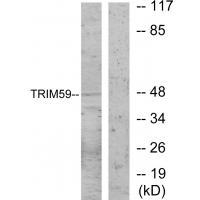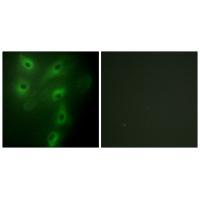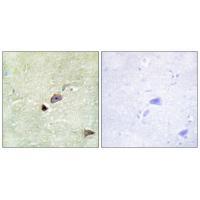


| WB | 1/500-1/3000 | Human,Mouse,Rat |
| IF | 咨询技术 | Human,Mouse,Rat |
| IHC | 1/50-1/100 | Human,Mouse,Rat |
| ICC | 1/100-1/500 | Human,Mouse,Rat |
| FCM | 咨询技术 | Human,Mouse,Rat |
| Elisa | 咨询技术 | Human,Mouse,Rat |
| Aliases | Tripartite motif-containing protein 59; Tumor suppressor TSBF-1; RING finger protein 104; TRIM59; RNF104 |
| Entrez GeneID | 286827; |
| WB Predicted band size | 47kDa |
| Host/Isotype | Rabbit IgG |
| Antibody Type | Primary antibody |
| Storage | Store at 4°C short term. Aliquot and store at -20°C long term. Avoid freeze/thaw cycles. |
| Species Reactivity | Human,Mouse |
| Immunogen | Synthesized peptide derived from internal of human TRIM59. |
| Formulation | Purified antibody in PBS with 0.05% sodium azide. |
+ +
以下是3篇涉及TRIM59抗体的文献示例(信息基于公开研究整理,建议通过学术数据库验证最新进展):
1. **《TRIM59 promotes cell proliferation and inhibits apoptosis in non-small cell lung cancer》**
- 作者:Li X, et al.
- 摘要:研究通过Western blot和免疫组化(使用TRIM59抗体)发现,TRIM59在肺癌组织中高表达,并通过调控PI3K/AKT通路促进肿瘤细胞增殖并抑制凋亡。
2. **《TRIM59 as a novel prognostic biomarker in gastric cancer》**
- 作者:Wang Y, et al.
- 摘要:利用TRIM59抗体检测胃癌组织样本,发现TRIM59表达水平与肿瘤分期、转移及患者生存率显著相关,提示其可作为潜在预后标志物。
3. **《TRIM59 interacts with EGR1 to activate the NF-κB signaling pathway in colorectal cancer》**
- 作者:Zhang H, et al.
- 摘要:通过免疫共沉淀(使用TRIM59抗体)揭示TRIM59与EGR1相互作用,激活NF-κB通路,促进结直肠癌进展和化疗耐药性。
4. **《TRIM59 deficiency suppresses hepatocellular carcinoma progression via destabilizing CDK2》**
- 作者:Chen L, et al.
- 摘要:研究通过shRNA敲低TRIM59并结合抗体检测,发现TRIM59通过稳定CDK2蛋白驱动肝癌细胞周期进程,靶向TRIM59可能具有治疗潜力。
注:以上为示例性内容,实际文献需通过PubMed或Google Scholar以“TRIM59 antibody”为关键词检索获取。
The TRIM59 antibody is a crucial tool for studying the biological functions and pathological roles of TRIM59 (Tripartite Motif-containing 59), a member of the TRIM protein family. TRIM59 contains a characteristic tripartite motif, including RING, B-box, and coiled-coil domains, which confer E3 ubiquitin ligase activity. This protein is involved in diverse cellular processes, such as proliferation, apoptosis, immune response, and carcinogenesis. Research has shown that TRIM59 is frequently dysregulated in cancers, including breast, lung, prostate, and gastric cancers, where its overexpression often correlates with poor prognosis, suggesting its potential as a diagnostic biomarker or therapeutic target.
The TRIM59 antibody is specifically designed to detect endogenous TRIM59 protein in various experimental applications, such as Western blotting, immunohistochemistry (IHC), immunofluorescence (IF), and flow cytometry. It enables researchers to analyze TRIM59 expression levels, subcellular localization, and interactions with other molecules, such as p53 or NF-κB pathway components, which are critical for understanding its role in tumorigenesis and metastasis. Commercially available antibodies are typically developed in hosts like rabbits or mice, with validation across multiple cell lines or tissues to ensure specificity, often confirmed by knockout (KO) controls.
Beyond cancer, TRIM59 antibodies also aid in exploring its involvement in immune regulation and infectious diseases, as TRIM59 modulates antiviral responses and inflammatory signaling. These studies highlight its dual role in health and disease, driving ongoing research into its mechanisms and therapeutic potential.
×